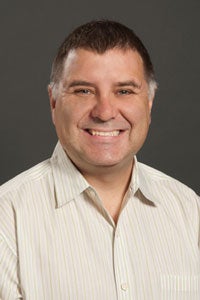
Royce Hutson, associate professor in the School of Social Work, studies people affected by armed violence and devastating natural disasters, in particular the people in Lebanon and Haiti.
Hutson just published “Violence in the ‘Ayn al-Hilweh Palestinian Refugee Camp in Lebanon, 2007-2009” in the International Social Work journal with coauthors Harry Shannon, from McMaster University in Hamilton, Ontario, and Taylor Long, from University of Michigan in Ann Arbor, Mich.
Hutson served as a visiting professor to the Lebanese American University in Beirut, Lebanon in 2007 and 2008. During this time, he conducted several surveys, including the one featured in his recently published paper, which focused on the Palestinian refugee camps, where Palestinians live in poor conditions, experience discrimination, and often suffer from post-traumatic stress disorder (PTSD).
More than 100,000 Palestinian refugees settled in Lebanon when they were displaced during the 1948 Arab-Israeli War. These refugees were registered with the United Nations Relief and Works Agency (UNRWA) and they and their descendants have access to a range of UNRWA social services and some freedom of movement with Lebanon. Refugees who arrived after 1948 and their descendants do not have such documentation, which prevents them from accessing UNRWA services and restricts their movement within Lebanon. Approximately 60 percent of the Palestinian refugees reside in 12 refugee camps in Lebanon; the remaining refugees live in 47 unofficial “gatherings” near the major Lebanese cities. ‘Ayn al-Hilweh is the largest refugee camp in Lebanon and experiences frequent factional violence and harbors individuals wanted by the Lebanese authorities, making the camp of particular concern to policy-makers. The survey study was funded by the Foreign and Commonwealth Office of the United Kingdom and was conducted from July 29 to August 28, 2009.
Shannon, Hutson and several other colleagues developed a method of surveying the camps based on satellite and aerial photography in order to amass a random selection of households in difficult environments, such as a refugee camp or a city in ruins after a massive earthquake. Through a series of selection parameters, the team identified households at random throughout the camp. Interviewers then addressed an adult respondent for each household, who answered questions on behalf of all household members. Using questionnaire tools translated into Arabic, interviewers collected information about the household’s demographics, PTSD symptomatology, their locus of control, human rights history, and perceptions of safety and security in the camp.
Most of the respondents were Sunni, with one Shi’a respondent. The household averaged 4.29 people, which is just slightly larger than the average household size for Lebanon as a whole. The survey results suggest that 30.5 percent of the population of ‘Ayn al-Hilweh is under 18, the average age of the camp’s population is 29.2. Poverty is high in the camp, with 81 percent of the camp living below the upper poverty line of $4.00 per person, a 2008-indexed poverty line set in the United Nations Development Programme for Lebanon. 7.7 percent of the camp population are unregistered with the UNRWA.
Nineteen percent of respondents reported witnessing armed violence in the six months prior to the survey. However, 70 percent respondents in the southeast corner of ‘Ayn al-Hilweh reported witnessing violence and one neighborhood in the south of the camp, near this region, forced interviewers to leave the area. The research team suspects that their overall estimate of violence in the camp may be too low. Approximately two-thirds of respondents believe that ‘Ayn al-Hilweh is more dangerous than other refugee camps. An estimated 3400 adults were symptomatic for PTSD.
The results of the survey were presented to several embassies in Lebanon, the UNRWA in Lebanon, and numerous government and international departments.
Hutson’s other Lebanese surveys focus on the Lebanese on the Syrian frontier, and human rights violations in relation to smuggling and war victimization during the 2006 Israel–Hezbollah War. Hutson hopes to secure funding to return to Lebanon to conduct another survey of Syrian refugees, who currently make up a fifth of the Lebanese population.